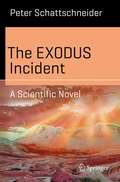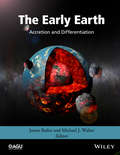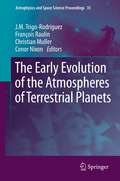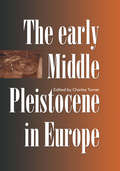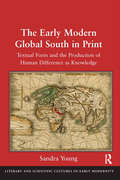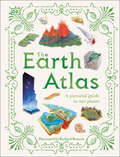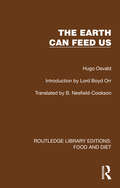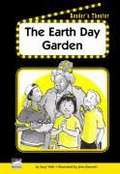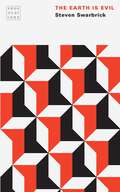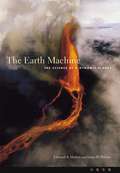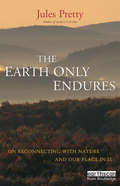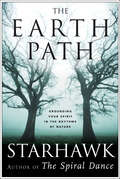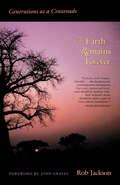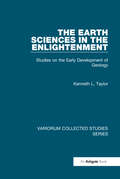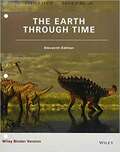- Table View
- List View
The EXODUS Incident: A Scientific Novel (Science and Fiction)
by Peter SchattschneiderIn the near future, Earth is suffering from climate change, famines, and fundamentalism. A global nuclear war is imminent. Interstellar probes from the Breakthrough Starshot project initiated by J. Milner and S. Hawking have discovered a habitable planet in the stellar system Proxima Centauri, just in time for the exodus of the elites. On board the EXODUS starship, the crew starts to experience strange things. The voyage to Atlantis, the new home for mankind, enters a mysterious and disquieting territory, where conspiracy theories about what is real and what is virtual emerge. THE EXODUS INCIDENT is a novel about an interstellar journey, which connects science to virtual realities and epistemology. In the guise of a final investigative report, a scientific treatise discusses the physics and mathematics behind the story: the starship, the fusion thruster, the target planet, and the journey, addressing anomalous effects which involve relativistic speed and deep space environments.
The Eagle Mother (Mothers of Xsan)
by Hetxw’ms Gyetxw HusonReturn to the valleys of the River of Mists with author Hetxw'ms Gyetxw (Brett D. Huson) and his award-winning, richly illustrative Mothers of Xsan series. &“An incredible celebration of the deep connections that are essential to the relationships between mothers and their children&”—The Globe and MailNox xsgyaak, the eagle mother, cares for her brood in the embrace of a black cottonwood with the help of her mate. Will both eaglets survive the summer in an environment that is both delicate and unforgiving?Learn about the life cycle of these stunning birds of prey, the traditions of the Gitxsan, and how bald eagles can enrich their entire ecosystem. Evocative illustration brings the Xsan's flora and fauna to life for middle years readers in book three of the Mothers of Xsan series.
The Eagle Mother (Mothers of Xsan)
by Hetxw’ms Gyetxw HusonReturn to the valleys of the River of Mists with author Hetxw'ms Gyetxw (Brett D. Huson) and his award-winning, richly illustrative Mothers of Xsan series. &“An incredible celebration of the deep connections that are essential to the relationships between mothers and their children&”—The Globe and MailNox xsgyaak, the eagle mother, cares for her brood in the embrace of a black cottonwood with the help of her mate. Will both eaglets survive the summer in an environment that is both delicate and unforgiving?Learn about the life cycle of these stunning birds of prey, the traditions of the Gitxsan, and how bald eagles can enrich their entire ecosystem. Evocative illustration brings the Xsan's flora and fauna to life for middle years readers in book three of the Mothers of Xsan series.
The Eagle and the River
by Charles CraigheadWyoming's Snake River is home to many creatures--elk, moose, coyotes, beavers, and birds of all kinds. It is winter, and the animals are searching for food--for grass and twigs under the snow, for plants and seeds in the cold water, or for the bits and bones leftover from another animal's meal. High in the sky, a bald eagle soars in lazy circles. It sees the bare trees, the blanket of snow covering the land, and the dark ribbon of water that is the Snake River. From the air, the eagle watches each creature. And it, too, searches for food. As it circles over the moving water, it watches for fish, waiting for one to come near the surface and become its supper.
The Early Earth: Accretion and Differentiation
by Michael J. Walter James BadroThe Early Earth: Accretion and Differentiation provides a multidisciplinary overview of the state of the art in understanding the formation and primordial evolution of the Earth. The fundamental structure of the Earth as we know it today was inherited from the initial conditions 4.56 billion years ago as a consequence of planetesimal accretion, large impacts among planetary objects, and planetary-scale differentiation. The evolution of the Earth from a molten ball of metal and magma to the tectonically active, dynamic, habitable planet that we know today is unique among the terrestrial planets, and understanding the earliest processes that led to Earth's current state is the essence of this volume. Important results have emerged from a wide range of disciplines including cosmochemistry, geochemistry, experimental petrology, experimental and theoretical mineral physics and geodynamics. The topics in this volume include: Condensation of primitive objects in the solar nebula, planetary building blocks Early and late accretion and planetary dynamic modeling Primordial differentiation, core formation, Magma Ocean evolution and crystallization This volume will be a valuable resource for graduate students, academics, and researchers in the fields of geophysics, geochemistry, cosmochemistry, and planetary science.
The Early Evolution of the Atmospheres of Terrestrial Planets
by Christian Muller Conor Nixon François Raulin J.M. Trigo-Rodriguez"The Early Evolution of the Atmospheres of Terrestrial Planets" presents the main processes participating in the atmospheric evolution of terrestrial planets. A group of experts in the different fields provide an update of our current knowledge on this topic. Several papers in this book discuss the key role of nitrogen in the atmospheric evolution of terrestrial planets. The earliest setting and evolution of planetary atmospheres of terrestrial planets is directly associated with accretion, chemical differentiation, outgassing, stochastic impacts, and extremely high energy fluxes from their host stars. This book provides an overview of the present knowledge of the initial atmospheric composition of the terrestrial planets. Additionally it includes some papers about the current exoplanet discoveries and provides additional clues to our understanding of Earth's transition from a hot accretionary phase into a habitable world. All papers included were reviewed by experts in their respective fields. We are living in an epoch of important exoplanet discoveries, but current properties of these exoplanets do not match our scientific predictions using standard terrestrial planet models. This book deals with the main physio-chemical signatures and processes that could be useful to better understand the formation of rocky planets.
The Early Middle Pleistocene in Europe
by Charles TurnerThese papers show how new research in the classic areas and Germany, but particularly in Eastern Europe, is radically altering views of the stratigraphy and palaeocology of the early-middle Pleistocene period, showing that major glaciations did not begin only in the late- middle Pleistocene.
The Early Modern Global South in Print: Textual Form and the Production of Human Difference as Knowledge (Literary And Scientific Cultures Of Early Modernity Ser.)
by Sandra YoungEarly modern geographers and compilers of travel narratives drew on a lexicon derived from cartography’s seemingly unchanging coordinates to explain human diversity. Sandra Young’s inquiry into the partisan knowledge practices of early modernity brings to light the emergence of the early modern global south. Young proposes a new set of terms with which to understand the racialized imaginary inscribed in the scholarly texts that presented the peoples of the south as objects of an inquiring gaze from the north. Through maps, images and even textual formatting, equivalences were established between ’new’ worlds, many of them long known to European explorers, she argues, in terms that made explicit the divide between ’north’ and ’south.’ This book takes seriously the role of form in shaping meaning and its ideological consequences. Young examines, in turn, the representational methodologies, or ’artes,’ deployed in mapping the ’whole’ world: illustrating, creating charts for navigation, noting down observations, collecting and cataloguing curiosities, reporting events, formatting materials, and editing and translating old sources. By tracking these methodologies in the lines of beauty and evidence on the page, we can see how early modern producers of knowledge were able to attribute alterity to the ’southern climes’ of an increasingly complex world, while securing their own place within it.
The Earth
by Minoru Ozima Jun Korenaga Qing-Zhu YinA clear understanding of the Earth's past evolution can provide the key to its possible future development. The Earth: Its Birth and Growth explores the evolution of the Earth over 4. 6 billion years using basic reasoning and simple illustrations to help explain the underlying physical and chemical principles and major processes involved. Fully updated and revised, this rigorous but accessible second edition includes three completely new chapters. It incorporates exciting developments in isotope geology, placing results within a wider framework of Earth evolution and plate tectonics. Some background in physics and chemistry is assumed, but basic theories and processes are explained concisely in self-contained sections. Key research papers and review articles are fully referenced. This book is ideal as supplementary reading for undergraduate and graduate students in isotope geochemistry, geodynamics, plate tectonics and planetary science. It also provides an enjoyable overview of Earth's evolution for professional scientists and general readers.
The Earth Atlas
by DKDelve beneath the surface of Earth with this pictorial atlas and discover the secrets of our planet.How did planet Earth form? What&’s under the surface, and how can we see it? Why do volcanoes erupt? What do coasts and caves have in common? What&’s so important about rocks and soil? If you find yourself seeking the answers to these questions and more, then this may be the book for you!Introducing The Earth Atlas – a lavishly illustrated guide to our planet. From oceans to ice regions to deserts, this book takes you on an exciting trip to discover more about the Earth&’s features, explaining how they formed and what impact they have on us even today, supporting life and shaping the world with every tectonic movement!Ready for an adventure? Dive straight in to discover: - A strikingly visual guide to the innermost depths of our Earth- Exquisite hand-drawn illustrations and maps making the information engaging and accessible- A diverse range of fascinating information using captions and detailed cross sectionsFrom ferocious volcanoes to testing tornadoes, The Earth Atlas is an engaging, fact-packed, and educational book for children aged 9–12, especially those interested in natural science, geology, geography, or ecology. So whether you&’re a budding young geographer, or a teacher looking for an engaging resource to use in your classroom, this earth encyclopedia is full of fascinating facts that are sure to delight young readers time and time again. At DK, we believe in the power of discovery. So why stop there? If you like The Earth Atlas, then why not complete the collection? Take a peek inside the beautiful and absorbing world of birds with The Bird Atlas, explore the awe-inspiring animal kingdom with The Animal Atlas and reveal the inner workings of the human body with The Body Atlas. Whatever your preferred topic, this fact-packed and fun series from DK is sure to delight!
The Earth Book: From the Beginning to the End of Our Planet, 250 Milestones in the History of Earth Science (Union Square & Co. Milestones)
by Jim BellA beautifully illustrated presentation of 250 milestones in the history of our home planet, from celebrated geologist and planetary scientist Jim Bell. Spanning Earth&’s entire history, from its birth 4.6 billion years ago to its inevitable destruction billions of years into the future, this stunning volume chronicles the life of our home planet in 250 well-chosen milestones. Jim Bell leads us on a tour of the events, processes, people, and places that have shaped our growing knowledge of Earth, from the oceans&’ formation and the first perilous polar expeditions to deadly volcanoes and Earth &“selfies&” from space. He covers relevant topics in a range of fields, including physics, chemistry, biology, astronomy, geology, mineralogy, planetary science, life science, public policy, atmospheric/climate science, and engineering, along with notes on key scientists and inventors. At a time when it's crucial to understand Earth as a complex interdependent system, and our role in that system, The Earth Book will enhance your appreciation of our home.
The Earth Can Feed Us (Routledge Library Editions: Food and Diet)
by Hugo OsvaldOriginally published in 1966, the extremely urgent task confronting our generation – to produce food in sufficient quantity and of adequate quality for the world’s rapidly increasing population – may have appeared terrifyingly great and very difficult to solve. In fact, some regarded it as impossible, visualising a world in which the population would increase quicker even than scientific man could feed it and seeing a solution only in wholesale birth control.To these Hugo Osvald, a Scandinavian nutrition expert, did not belong. He surveys all the means, scientific and agricultural at our disposal at the time and reveals that, by their rapid development, enough food can be produced for a world population several times larger than at present. There are practically no limits, he said, to the possibilities of producing food. We were utilizing only a small percentage of the earth’s capacity.Even the lands where starvation was prevalent have the same basic necessary conditions for a vast improvement: fertile soil, water and labour. Knowledge and guidance were already available and could be increased. Dams, irrigation systems, transport facilities and power supplies, fertilizer factories, plant breeding and protection, animal husbandry, technical education – all these could be provided and the possibilities of the oceans as a source of supply had scarcely been explored.The author considered all these factors and the problems involved, and brings a convincing answer to the pessimists. With food poverty still an issue today, this book can be read in its historical context.
The Earth Day Garden
by John Bennett Jeffrey Fuerst Suzy WallPerform this script about people who work together to turn an empty lot into a garden.
The Earth Is Evil (Provocations)
by Steven SwarbrickThe Earth Is Evil examines the connection between subjectivity and lack, arguing for a destituent ecology that sees lack as the universalist core of social, political, and environmental struggles. Steven Swarbrick maintains that psychoanalysis does not simply help us integrate our desires into a constituency of multispecies actors. Instead, psychoanalysis destitutes our fantasies of ecological and psychic wholeness. That destitution, he argues, is the unconscious source of our enjoyment. Exploring films by Lars von Trier, Kelly Reichardt, Daniel Kwan, and Daniel Scheinert, among others, and intervening in trenchant debates about negativity and desire, Swarbrick urges a return to the existentialist subject of lack against the flattening of subjectivity by ecocriticism. The Earth Is Evil is a vigorous attempt to construct a leftist environmental movement in dialogue with the most radical currents of critical theory.
The Earth Is Good
by Michael DemunnSimple text and illustrations introduce the earth and its treasures, including its trees, flowers, animals, and weather.
The Earth Machine: The Science of a Dynamic Planet
by James D. Webster Edmond A. MathezFrom the scorching center of Earth's core to the outer limits of its atmosphere, from the gradual process of erosion that carved the Grand Canyon to the earth-shaking fury of volcanoes and earthquakes, this fascinating book -- inspired by the award-winning Hall of Planet Earth at New York City's American Museum of Natural History -- tells the story of the evolution of our planet and of the science that makes it work. With the same exuberance and expertise they brought to the creation of the Hall of Planet Earth, co-curators Edmond A. Mathez and James D. Webster offer a guided tour of Earth's dynamic, 4.6-billion-year history. Including numerous full-color photographs of the innovative exhibit and helpful, easy-to-understand illustrations, the authors explore the major factors in our planet's evolution: how Earth emerged from the swirling dusts of a nascent solar system; how an oxygen-rich, life-sustaining atmosphere developed; how continents, mountain ranges, and oceans formed; and how earthquakes and volcanic eruptions alter Earth's surface. Traversing geologic time and delving into the depths of the planet- -- beginning with meteorites containing minuscule particles that are the solar system's oldest known objects, and concluding with the unusual microbial life that lives on the chemical and thermal energy produced by sulfide vents in the ocean floor -- The Earth Machine provides an up-to-date overview of the central theories and discoveries in earth science today. By incorporating stories of real-life fieldwork, Mathez and Webster explain how Earth is capable of supporting life, how even the smallest rocks can hold the key to explaining the formation of mountains, and how scientists have learned to read nature's subtle clues and interpret Earth's ever-evolving narrative.
The Earth Machine: The Science of a Dynamic Planet
by James D. Webster Edmond A. MathezFrom the scorching center of Earth's core to the outer limits of its atmosphere, from the gradual process of erosion that carved the Grand Canyon to the earth-shaking fury of volcanoes and earthquakes, this fascinating book—inspired by the award-winning Hall of Planet Earth at New York City's American Museum of Natural History—tells the story of the evolution of our planet and of the science that makes it work. With the same exuberance and expertise they brought to the creation of the Hall of Planet Earth, co-curators Edmond A. Mathez and James D. Webster offer a guided tour of Earth's dynamic, 4.6-billion-year history.Including numerous full-color photographs of the innovative exhibit and helpful, easy-to-understand illustrations, the authors explore the major factors in our planet's evolution: how Earth emerged from the swirling dusts of a nascent solar system; how an oxygen-rich, life-sustaining atmosphere developed; how continents, mountain ranges, and oceans formed; and how earthquakes and volcanic eruptions alter Earth's surface. Traversing geologic time and delving into the depths of the planet-—beginning with meteorites containing minuscule particles that are the solar system's oldest known objects, and concluding with the unusual microbial life that lives on the chemical and thermal energy produced by sulfide vents in the ocean floor—The Earth Machine provides an up-to-date overview of the central theories and discoveries in earth science today. By incorporating stories of real-life fieldwork, Mathez and Webster explain how Earth is capable of supporting life, how even the smallest rocks can hold the key to explaining the formation of mountains, and how scientists have learned to read nature's subtle clues and interpret Earth's ever-evolving narrative.
The Earth Only Endures: On Reconnecting with Nature and Our Place in It
by Jules PrettyFor most of human history, we have lived our daily lives in a close relationship with the land. Yet now, for the first time, more people are living in urban rather than rural areas, bringing about an estrangement. This book, by acclaimed author Jules Pretty, is fundamentally about our relationship with nature, animals and places. A series of interlinked essays leads readers on a voyage that weaves through the themes of connection and estrangement between humans and nature. The journey shows how our modern lifestyles and economies would need six or eight Earths if the entire world?s population adopted our profligate ways. Pretty shows that we are rendering our own world inhospitable and so risk losing what it means to be human: unless we make substantial changes, Gaia threatens to become Grendel. Ultimately, however, the book offers glimpses of an optimistic future for humanity, in the very face of climate change and pending global environmental catastrophe.
The Earth Path: Grounding Your Spirit in the Rhythms of Nature
by StarhawkThe bestselling author uses Wiccan sacred texts to show how we can have a more intimate connection with our surroundings.From time immemorial, artists and poets, prophets, and shamans have drawn strength and inspiration from walking the earth. In The Earth Path, bestselling author Starhawk takes the reader on a journey into the heart of the natural world, showing how we can have a more intimate connection with the world that surrounds us.Institutionalized religions have sacred texts—messages written in holy books that are the inspiration for their beliefs and rituals. But the sacred texts for Wicca, like other ancient native or indigenous traditions, are written in nature—in the magic circle of the elements: air, fire, water, and earth. With The Earth Path, Starhawk, an activist, ecofeminist, and leader in the women’s spirituality movement, places you in the center of that magical circle. As you become attuned to the rhythms of the earth, your thinking will shift from focusing on isolated objects to marveling at the multitude of interconnecting patterns and relationships in nature. These patterns and connections can hold the key to your own spiritual renewal and restore your sense of responsibility for preserving this world that nurtures and sustains us.Filled with awareness exercises, inspiring meditations, and magical rituals, The Earth Path not only teaches the reader to respect the ecology of our natural world, but shows how to spiritually connect with and channel the powers inherent in nature.Praise for The Earth Path“Starhawk presents an array of exercises and practices for sharpening observation and listening skills. She engages readers’ spirits and minds through her illustrative storytelling, offering ways to communicate more fully with the world and suggesting ways to act.” —Publishers Weekly“Lucid, appealing . . . a broad philosophy of harmony with nature, of human concord, sexual liberation, creativity, and healthy pleasure, as expressed and celebrated in a freewheeling worship of the universe.” —Kirkus Reviews
The Earth Remains Forever: Generations at a Crossroads
by Rob JacksonWriting especially for people who've tuned out the environmental debate, Rob Jackson persuasively argues that we're at a crucial turning point in environmental history, where choices we make now will determine the quality of life into the unforeseeable future. Laying out the scientific facts in plain language and with flashes of humor, he shows how the escalation of population growth and resource consumption in the twentieth century caused problems from ozone depletion to global warming, habitat destruction, and biodiversity loss. At the same time, however, he highlights ongoing solutions to these problems and ways in which we can create a sustainable future for subsequent generations and all life on earth. His urgent message is not that we've already failed, but that we can succeed.
The Earth Sciences in the Enlightenment: Studies on the Early Development of Geology (Variorum Collected Studies)
by Kenneth L. TaylorThis volume is concerned with the geological sciences in the 18th century, with special emphasis on France and French scientists. A first focus is on the pioneering geologist Nicolas Desmarest, whose investigations in Auvergne and Italy (among other places) had important consequences in geological theory and practice. Desmarest emerges as a figure of intriguing complexity and refined methodological convictions, defying facile interpretation in terms of, for instance, a simple polarity between vulcanism and neptunism. Widening his inquiry beyond Desmarest, Professor Taylor also endeavors to recover key elements of the presuppositions and thought-patterns of Enlightenment geologists, and to discern how geological investigation worked during this formative period. In the era that modern geological science was beginning to take form, many of the participants are seen as struggling to define their scientific objectives and procedures by drawing from the competing frameworks of physique or natural philosophy, descriptive natural history, and antiquarian scholarship or developmental history. One of the articles (Reflections on Natural Laws in Eighteenth-Century Geology) appears here for the first time in English.
The Earth Sciences: An Annotated Bibliography (Routledge Revivals)
by Roy PorterOriginally published in 1983, The Earth Sciences: An Annotated Bibliography is a compact and thematically organized guide that provides comprehensive access to themes and areas of study in the earth sciences. The bibliography is not exhaustive but provides a detailed and critical index to the most important literature in the field. The book’s core focus is geology and examines the subject broadly, covering everything from glaciology, geomorphology, natural history and palaeontology, to oceanography, mapping, stratigraphy and evolution. The book provides detailed essays for each bibliographical chapter on the state of each field of research and the literature compiled for each bibliography will go as far back as around 1700 and contains a wide range of sources from across the world. This book will be of interest to academics and students of natural history, geology, and environmental sciences alike.
The Earth Shook, the Sky Burned: A Photographic Record of the 1906 San Francisco Earthquake and Fire
by William BronsonIllustrated with more than four hundred on-the-scene photographs, this is the definitive account of the 1906 earthquake and fire that devastated San Francisco.The Earth Shook, The Sky Burned tells the tragic story of the four days of upheaval and destruction that swept San Francisco when a violent earth tremor rocked the land, succeeded rapidly by a devastating fire that destroyed nearly thirty thousand buildings and left more than a quarter million people homeless. William Bronson’s blow-by-blow account is full of dramatic detail and includes a fascinating cast of characters, including Enrico Caruso, John Barrymore, and other turn of the century icons. A classic of San Francisco history, The Earth Shook, The Sky Burned reveals what really happened that April morning when the face of the city was changed forever.
The Earth System: Investigating Water Shortages, Investigation Notebook
by The Lawrence Hall of ScienceNIMAC-sourced textbook
The Earth Through Time
by Harold L. Levin David T. King Jr.The Earth Through Time, 11th Edition, by Harold L. Levin and David T. King chronicles the Earth's story from the time the Sun began to radiate its light, to the beginning of civilization. <p><p> The goal of The Earth Through Time is to present the history of the Earth, and the science behind that hsitory, as simply and clearly as possible. The authors strived to make the narrative more engaging, to convey the unique perspective and value of historical geology, and to improve the presentation so as to stimulate interest and enhance the reader's ability to retain essential concepts, long after the final exam.
